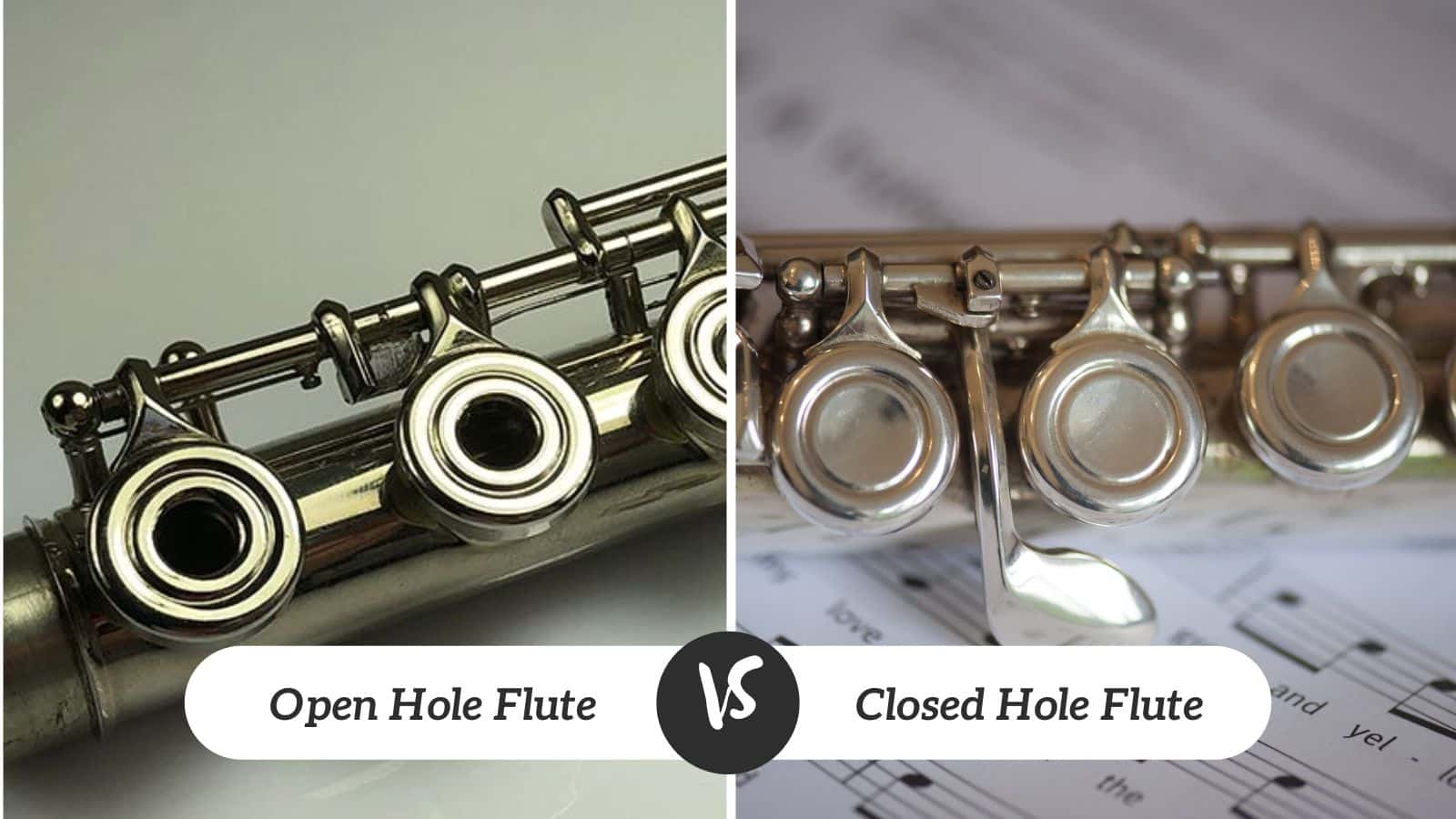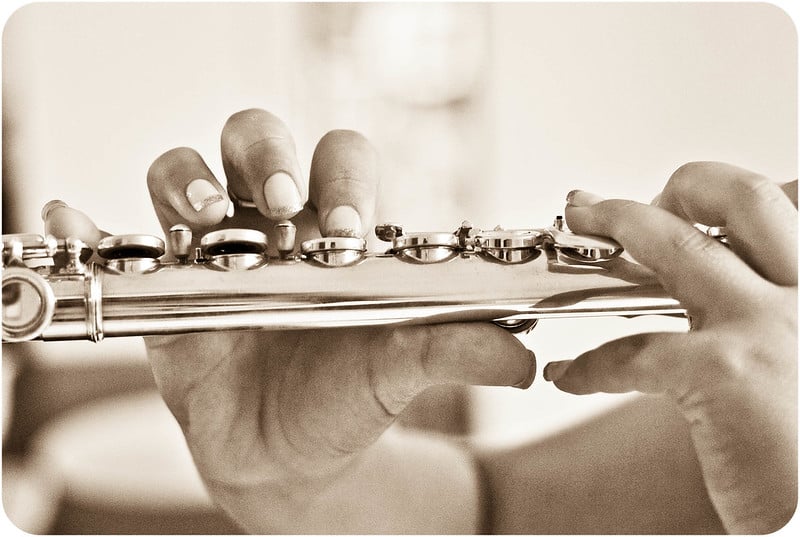
When observing different types of flutes, one might question why some have solid keys while others have holes in the keys.
From the price point of the instruments, it comes as no surprise that the closed hole flutes are generally found on student flutes and meant for beginners, while open hole flutes are seen on instruments meant for more advanced players.
But why is this? Is it more expensive to have an open hole flute? Does it make a significant difference in sound? Is it harder to play an open hole flute? These questions have been debated by flutists for a long time.
Open Hole vs Closed Hole Flute
Both open and closed hole flutes contain closed keys. In fact, an open hole flute actually only has five open keys. Theoretically, an open hole flute has several benefits, though these benefits are rarely realized by amateur players.
Because of these benefits, however, some intermediate and nearly all advanced flutes are made with open holes, with few closed hole options available. The current main purpose of closed hole flutes is to make learning easier for new flutist.
In order to produce the correct sound on an open hole flute, the flutist must completely cover the entire hole. Conversely, on a closed hole flute, all the flutist must do is press down on the key.
This may be preferable to beginners who are concentrating on learning the fingerings rather than extremely precise hand positioning. Additionally, many novices are young and therefore have small hands.
Young students may need to wait for their hands to reach an adult size in order to play an open hole flute with ease. However, there is an option to buy plugs for an open hole flute in order to make the transition.
Students can remove the plugs one by one as they become accustomed to covering each new hole. Some players may even choose to leave one or two plugs in permanently.
But why should one transition to an open hole flute at all? The first open hole flutes surfaced in France in the 1840s, but not everyone immediately agreed that these were higher quality flutes.
Some believed that closed hole instruments afforded flutists more ease and speed of technique and better intonation. The flute community continues to be split on this matter.
Many believe that open hole flutes actually have superior intonation instead, as there is more flexibility for controlling the pitch. Open hole flutes are also often considered to have a better tone quality, even though the difference is probably slight.
Another argument is that an open hole flute promotes better hand position, as the positioning needs to be more precise. In some cases, this hand position may feel unnatural to players, however, causing discomfort or even injury.
The biggest argument for an open hole flute is its ability to play extended techniques, which are often called for in modern music. Effects such as multiphonics, pitch bends, and quarter tones are simply not possible on closed hole flutes.
Playing music that contains these techniques is not necessarily required of all flutists, as there is a broad range of repertoire for the flute that is more standard and does not include them.
However, it is often required for flutists to play contemporary music if pursuing a degree in flute performance, and contemporary pieces are being programmed more in orchestras.
If a serious flutist wants a versatile career or shows a strong interest in contemporary playing, an open hole flute is strongly recommended. Below you will find a breakdown of the differences between closed and open hole options:
| Closed Hole | Open Hole | |
|---|---|---|
| Level Designed For | Beginner - Intermediate | Intermediate - Advanced |
| Difficulty to Play | Easier Without needing to cover holes, the player may be able to achieve faster technique | More difficult, especially at first It takes time to learn how to play without plugs on an open hole flute, as it requires more specificity of finger placement. |
| Cost | Generally less expensive As they are meant for beginners, they are usually much less expensive. The exception is if a professional player custom-requests a closed hole flute. | Generally more expensive As instruments meant for more advanced players, the specs on open hole flutes tend to make them more expensive. |
| Sound Quality | Debatable/negligible Many people believe closed hole flutes have a lesser sound, but this is generally disproven. A great player can sound excellent on a closed hole flute. However, many closed hole flutes are student models, which do have limitations. Thus, the sound quality is due more to the basic model rather than the type of key. | Debatable/negligible Many believe that an open hole flute has a richer sound, but if this has any basis to it, the difference is negligible. However, as most professional, custom-made flutes are open hole, these flutes do tend to sound better, largely due the metal, design, and other specs rather than the type of key. |
| Intonation | Debatable/negligible It is quite possible that the addition of open holes to flutes created some minor tuning problems to the instrument. However, this intonation difference is small and easily offset. | Debatable/negligible While open hole flutes do not have “better” intonation, some might claim that they do, simply because flutists have the option to partially cover the open keys to adjust for tuning problems, especially sharpness. |
| Hand Position | Slightly disadvantageous, with exceptions Because less precision is required, students can develop weaker hand position and therefore less effective technique. However, if a player’s hand is not equipped naturally to cover the holes, a closed hole flute is a great option to prevent pain. | Slightly advantageous, with exceptions Many believe that an open hole flute promotes better hand position, as the hand must be placed a certain way to cover the holes effectively. |
| Extended techniques | Less capability While there are several extended techniques a closed hole flute can produce, there are some that require open hole keys, thereby limiting the instrument’s ability to play certain music. | More capability More extended techniques are available on an open hole flute, including pitch bends, quarter tones, and multiphonics. |
Most flutists in current times are in agreement that unless a player is invested in being able to play contemporary music, there is not a significant difference between the two styles of flutes.
Open hole flutes are simply more prevalent in the flute community because they are in fashion and are the default for most intermediate and advanced instruments.
At the end of the day, the choice between an open and closed hole flute should be a matter of personal preference.


Which would be easier for Jazz? I would say open, but I need to try one, first.